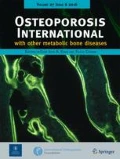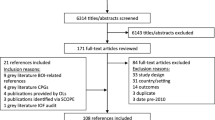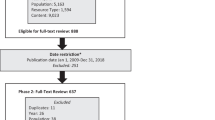Abstract
Osteoporosis causes considerable morbidity, mortality and resource utilization in industrialized nations. Its burden is relatively well known in United States and Canada, but poorly studied in the rest of America. This study aimed to discover the burden of osteoporosis in Latin America through a review of literature and publicly available information. In this transversal and descriptive study, information from 20 countries in Latin American region was collected from diverse published and electronic sources. Rheumatologists and bone specialists were asked for additional information through a questionnaire created by consensus. In the year 2000, the population of the Latin America and Caribbean region was 524 million from diverse ethnic origins. On average, 5.5% of the population is 65 years and older. However, with life expectancy higher than 70 years in most countries, a significant growth in the elderly population is anticipated. Studies using World Health Organization’s criteria for osteoporosis report 12–18% of women 50 years and older with vertebral osteoporosis and 8–22% with proximal femur osteoporosis. Community based studies in Argentina reported between 263 and 331 hip fractures per 100,000 people 50 years and older. Hospital based studies in Colombia, Chile, Brazil, Mexico, Panama, Peru and Venezuela reported between 40 and 362 hip fractures per 100,000 persons aged 50 and more. Between 17 and 37% of hip fracture sufferers die in the year following fracture. Prevalence of vertebral fractures in community-dwelling women aged 50 and more in Mexico is 19.35%. Data on other fractures are rare. Direct costs of a hip fracture ranged from $4500 to $6000. National gross income per capita in the region ranges from $410 to $7550. The burden of osteoporosis varies across countries with differences in populations and health resources. Considerable support for research is required, since numerous gaps in knowledge need to be filled to face the anticipated explosive growth in osteoporotic fractures.


Similar content being viewed by others
References
Consensus Development Conference (1991) Diagnosis, prophylaxis and treatment of osteoporosis. Am J Med 90:107–110
Melton LJ III (1995) How many women have osteoporosis now ? J Bone Miner Res 10:175–177
Cooper C, Campion G, Melton LJ III (1992) Hip fractures in the elderly: a world-wide projection. Osteoporos Int 2:285–289
Cooper C, Atkinson EJ, Jacobsen SJ et al. (1993) Population-based study of survival following osteoporotic fractures. Am J Epidemiol 137:1001–1005
Ray NF, Chan J K, Thamer M et al. (1997) Medical expenditures for the treatment of osteoporotic fractures in the United States in 1995: Report from the National Osteoporosis Foundation. J Bone Miner Res 12:24–35
Reginster JY, Gillet P, BenSedrine W et al. (1999) Direct costs of hip fractures in patients over 60 years old, in Belgium. PharmacoEconomics 15:507–514
Office of Health Economics (1990) Osteoporosis and the risk of fracture. Office of Health Economics, London
Lyritis G (1992) Epidemiology and socioeconomic cost of osteoporotic fractures in Greece. Calcif Tissue Int 51:93–94
Simonen O (1988) Epidemiology and socioeconomic aspects of osteoporosis in Finland. Ann Chir Gynaecol 77:173–175
Lane A (1996) Direct costs of osteoporosis for New Zealand Women. PharmacoEconomics 9:231–245
Lippuner K, von Overbeck J, Perrelet R et al. (1997) Incidence and direct medical costs of hospitalizations due to osteoporotic fractures in Switzerland. Osteoporos Int 7:414–425
Lopez Vaz A (1993) Epidemiology and costs of osteoporotic hip fractures in Portugal. Bone 14:S9
Gullberg B, Johnell O, Kanis JA (1997) Worldwide projections for hip fracture. Osteoporos Int 7:407–441
Melton L J III (1993) Hip Fractures: a worldwide problem today and tomorrow. Bone 14:S1–S8
Report of WHO Study Group (1994) Assessment of fracture risk and its application to screening for postmenopausal osteoporosis. WHO Technical Report Series 843, Geneva
Ben Sedrine W, Reginster JY, Radican L 2001 On conducting burden of osteoporosis studies: review of core concepts and practical issues. Rheumatology 40:7–14
Phillips Fox N, Jacobs J, Wright WE (1988) The direct medical costs of osteoporosis for American women aged 45 and older, 1986. Bone 9:271–279
Melton LJ III, Thamer M, Ray NF et al. (1997) Fractures attributable to osteoporosis: report from the National Osteoporosis Foundation. J Bone Miner Res 12:16–23
World Population 1995–2050 (the 1998 revision) (1998) Europe, America, and Australasia (excluding Melanesia). Population Division. Department of Economic and Social Affairs. United Nations, New York
CELADE (2000) Boletin Demografico No. 66 América Latina: Población por Años Calendario y Edades Simples 1995–2005. Julio 2000, Cepal-Eclac. Santiago, Chile
World Development Indicators 2001. Size of the Economy. The World Bank Group, Washington (www.wordlbank.org)
WHO (2000) The World Health Report 2000. World Health Organization, Geneva
Delezé M, Cons-Molina F, Villa AR et al. (2000) Geographic differences in bone mineral density of Mexican women. Osteoporos Int 11:562–569
Santos Hernández C, Hernández Martínez A, González de la Nuez J, Ugarte Suárez J C, Fernández Madero I (2001) Estudio de Masa Ósea en la Población Cubana. Presented at the first Mexican Congress on Osteoporosis, January 12, Acapulco México
Lewin S, Gouvela C H de A, Marone, Wehba S, Malvestiti L F, Bianco A C (1996) Densidad Mineral Osea Vertebral e Femoral de 724 Mulheres Brancas Brasileiras: Influencia da Idade e do Peso Corporal. Rev Ass Med Brasil 47:2–6
Favus MJ (1993) Bone density reference data. In: Favus MJ (ed) Primer on the metabolic bone diseases and disorders of mineral metabolism, 2nd edn. Raven Press, New York, pp 426–430
Szejnfeld L, Atra E, Baracat EC, Aldrighi JM, Civitelli R (1995) Bone density in white Brazilian women: rapid loss at the time around the menopause. Calcif Tissue Int 56:186–191
Hui SL et al. (1997) Universal standardization of bone density measurements: a method with optimal properties for calibration among several instruments. J Bone Miner Res 12:1463–1470
International Committee for Standards in Bone Measurement (1997) Standardization of proximal femur bone mineral density (BMD) measurements by DXA. Bone 21:369–370
Delezé M, Aguirre E, Villa A et al. (1997) The prevalence of osteoporosis and osteopenia by DEXA in Mexico. J Bone Miner Res 12:S-247
Loker AC, Johnston CC Jr, Wahner HW et al. (1995) Prevalence of low femoral bone density in older US women from Nhanes III. J Bone Miner Res 10:796–802
Arzac P, Tamayo J et al. (1996) How many women have osteoporosis in Médica Sur osteoporosis clinic. J Bone Miner Res 11:S361
Carmona F (1999) Osteoporosis en Santa Fe de Bogotá. Instituto Nacional de Salud, Santa Fe de Bogotá
Arriagada M, Arinoviche R, Rodríguez JA (1987) The prevalence of osteopenia and osteoporosis in Chile. Galenus 9:33–36
Gallagher JC, Melton LJ, Riggs BL et al. (1980) Epidemiology of fractures of the proximal femur in Rochester, Minnesota. Clin Orthop Rel Res 150:163–171
Bagur A, Mautalen C, Rubin Z (1994) Epidemiology of hip fractures in an urban population of Central Argentina. Osteoporos Int 4:332–335
Soma LF, Rosso GZ, Trobo RI, Barreira JC, Messina OD (1999) Epidemiología de la Fractura de Fémur Proximal en Luján. Osteology 2:46–54
Bacon WE, Maggi S, Looker A, Harris T et al. (1996) International comparison of hip fracture rates in 1988–89. Osteoporos Int 6:69–75
Schwartz AV, Kelsey JL, Maggi S, Tuttleman M et al. (1999) International variation in the incidence of hip fractures: cross national project on osteoporosis for the World Health Organization Program for Research on Aging. Osteoporos Int 9:242–253
Komatsu RS, Jennings-Simoes MF, Ramos LR, Szejnfeld VL (1999) Incidence of fractures of the proximal femur in Marilia, Sao Paulo, Brazil, 1994 and 1995. Rev Bras Reumatol 39:325–331
Contreras GL, Kirschbaum KA, Pumarino CH (1991) Epidemiología de las Fracturas en Chile. Rev Méd Chile 119:92–98
Mautalen C, Pumarino H (1997) Epidemiology of osteoporosis in South America. Osteoporos Int 17:S73–S77
Chue de Coto E (1997) The incidence of hip fractures in pre-and postmenopausal women in Panama. Rev Med Panama 22:30–38
Morales Torres J, Hernández Ochoa C, Hernández Paz R, Hernández Morales G (1997) Fracturas de cadera en egresos de hospitales de León, Gto. Un indicador econométrico de osteoporosis. Rev Mex Reumat 12:119–124
Bauer RL (1988) Ethnic differences in hip fracture. Am J Epidemiol 127:145–149
Bauer RL, Diehl AK, Barton SA, Brender J, Deyo RA (1986) Risk of postmenopausal hip fracture in Mexican American women. Am J Public Health 76:1020–1021
Espino DV, Palmer RF, Miles TP et al. (2000) Prevalence, incidence and risk factors associated with hip fractures in community-dwelling older Mexican Americans: results of the Hispanic EPESE study. J Am Geriatr Soc 48:1252–1260
Davies KM, Stegman MR, Heaney RP (1996) Prevalence and severity of vertebral fracture: the Saunders County Bone Quality Study. Osteoporos Int 2:160–165
Melton LJ, Kan SH, Frye MA et al. (1989) Epidemiology of vertebral fractures in women. Am J Epidemiol 29:1000–1011
Jackson SA, Tenenhouse A, Robertson L (2000) Vertebral fracture definition from population-based data: preliminary results from the Canadian Multi Center Osteoporosis Study. Osteoporos Int 11:680–687
Bauer RL, Deyo RA (1987) Low risk of vertebral fracture in Mexican American women. Arch Int Med 147:1437–1439
Hannan EL, Magaziner J, Wang JJ et al. (2001) Mortality and locomotion 6 months after hospitalization for hip fracture: risk factors and risk-adjusted hospital outcomes. JAMA 285:2736–2742
Gómez García F (1998) Morbimortalidad de Fracturas de Cadera en el Hospital de Traumatología Magdalena de las Salinas, IMSS. Rev Mex Ortop Traum 2:48–52
Miraval Niño de Guzmán T, Segami SI, Chávez CJ et al. (2000) Fractura de cadera a trauma mínimo en mayores de 50 años: Morbimortalidad, pronóstico funcional. Rev Per Reumatol 6:68
Mosquera MT, Maurel DL, Pavon S et al. (1998) Incidencia y factores de riesgo en fracturas del fémur proximal por osteoporosis. Rev Panam Salud Pública 3:211–219
Ramalho AC, Lazaretti-Castro M, Hauache O et al. (2001) Osteoporotic fractures of proximal femur: clinical and epidemiological features in a population of the city of Sao Paulo. Sao Paulo Med J 119:48–53
Oviedo S (2001) Epidemiology of fractures in Chile. Bone 29:297–298
Becerra-Rojas F, Jupari M (2001) Epidemiology of osteoporosis in Peru. Bone 29:297
Clark P, de la Peña F, Gomez-Garcia F, Orozco JA, Tugwell P (1998) Risk factors for osteoporotic hip fractures in Mexicans. Arch Med Res 29:253–257
Espino DV, Palmer RF, Miles TP et al. (2000) Prevalence, incidence, and risk factors associated with hip fractures in community-dwelling older Mexican Americans: results of the Hispanic EPESE study. Establish Population for the Epidemiologic Study for the Elderly. J Am Geriatr Soc 48:1252–1260
Clark P, Lavielle P, Salmerón J Y, Cummings S (2003) Tasas de incidencia de fracturas de cadera en población mexicana mayor de 50 años. Rev Metab Oseo Min 1:41 (abstract)
Capunay MP, Vincentelo R, Dorregaray J, Angulo J (2002) Incidencia de fracturas de fémur proximal atribuible a osteoporosis en una población de Lima. J Clin Rheumatol 8:S49 (abstract)
Clark P, Delezé M, Cons-Molina F, Salmerón J, Palermo L, Cummings SR, y el grupo de estudio “LAVOS” (2003) Prevalencia de fracturas vertebrales en población mexicana. Rev Metab Oseo Min 1:41
Acknowledgements
The authors wish to thank the following persons for their contributions of information for this paper: O.D. Messina (Argentina); S. Ragi (Brazil); A. Iglesias and J. Rueda (Colombia); C. Santos-Hernández (Cuba); M. Arriagada and R. Arinoviche (Chile); A. García-Kutzbach (Guatemala); F. Cons and M. Delezé (Mexico); G. Guerra (Panama); J. Angulo-Solimano and Risto Perich (Peru); J. Hernández (Uruguay) and G. Riera (Venezuela). The authors also thank Professor J.Y. Reginster and Professor Shuvayu S. Sen, for reviewing this manuscript. This study was funded partly through an unrestricted educational grant from Merck Sharp & Dohme
Author information
Authors and Affiliations
Consortia
Corresponding author
Additional information
This study was performed under the auspices of the World Health Organization Collaborative Center, Liege, Belgium
Rights and permissions
About this article
Cite this article
Morales-Torres, J., Gutiérrez-Ureña, S. & Osteoporosis Committee of Pan-American League of Associations for Rheumatology (PANLAR). The burden of osteoporosis in Latin America. Osteoporos Int 15, 625–632 (2004). https://doi.org/10.1007/s00198-004-1596-3
Received:
Accepted:
Published:
Issue Date:
DOI: https://doi.org/10.1007/s00198-004-1596-3




